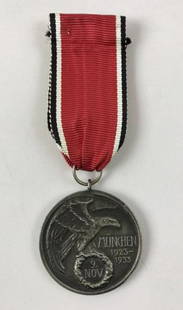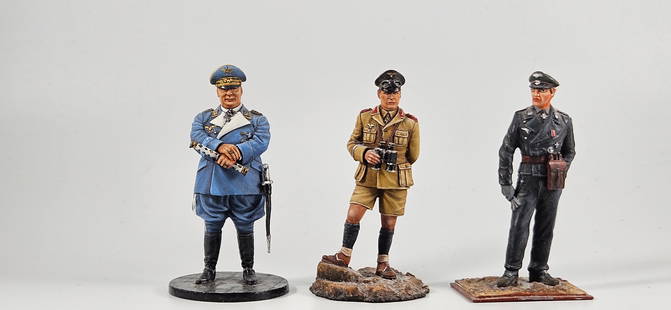
F. M. Kaufmann “Die schoensten Lieder der Ostjuden?? 1st ed., Music notes, Yiddish and German,
Similar Sale History
View More Items in Militaria & War Memorabilia
Related Militaria & War Memorabilia
More Items in Militaria & War Memorabilia
View MoreRecommended Collectibles
View More












Item Details
Description
Fritz Mordechai Kaufmann “Die schoensten Lieder der Ostjuden” 1st ed., Music notes, Yiddish and German, 1920
Siebenundvierzig ausgewählte Volkslieder
Berlin, Jüdischer Verlag, 1920. 100 pp., Litho hard cover. 24 x 17 cm, Alphabetisches Verzeichnis - Nach Gebieten: Religiöse und chaßidische Lieder - Wiegenliedei - Kinder- und Chederlieder - Liebeslieder - Mädchen- und Hochzeitslieder - Lieder aus dem Bereich der Familie und der Handwerker - Soldatenlieder und Lieder aus dem Volksleben. Alle Lieder mit Musik. - Glossar schwierigerer Wörter - Alphabetisches Liederverzeichnis
Each song has the musical notation with the Yiddish text of the songs in the Hebrew/Yiddish alphabet as well as in the Latin Alphabet. Also included is a glossary and index.
Good condition, some wear to spine.
Weight: 265 gr.
Fritz Mordechai Kaufmann (born December 13, 1888 in Eschweiler; died March 2, 1921 in Berlin. He committed rail suicide under unclear circumstances.) was a German essayist and author about Jewish folk music.
Max Friedrich Kaufmann was the second son of the textile merchant Hermann Kaufmann and Rosa Gochsheimer, who ran the men's clothing store Gebrüder Kaufmann in Eschweiler.[1] His brother Julius Kaufmann (1887–1955) had to emigrate to Palestine with his family in 1934. Fritz and Julius Kaufmann's commitment to Judaism at times went their separate ways, which was rooted in the controversy over Zionism.
Fritz Kaufmann graduated from high school in Eschweiler and from 1908 studied medicine for two semesters in Geneva and then history in Munich and Marburg, and in 1910 in Leipzig, where he broke off his studies and became interested in Yiddish-speaking Eastern Jews and learned the language. He was committed to Zionism. In 1912 he married the Odessa-born singer of Yiddish songs Rachel Kaganoff in Berlin. His first articles have now appeared in the weekly newspaper Jüdische Rundschau.
In 1913 he took part in a congress of the Zionist Social Democrats in Krakow, but under the influence of Nathan Birnbaum he turned away from Zionism and propagated an overarching “all-Judaism”. In 1913 he and his brother Julius published the magazine Die Freistatt. All-Jewish Revue, which was discontinued after 13 monthly issues due to the war. In 1914, like his brother, he became a soldier in the First World War. Since he fell ill with typhus and was unfit for military service, he was employed in the war archives in Frankfurt an der Oder in 1915 and then in the Office for Brandenburg War Disabled Welfare in Berlin. From 1919 he was general secretary of the “Workers Welfare Office of the Jewish Organizations of Germany”, which took care of the integration of Eastern Jewish immigrants. Kaufmann became a member of the USPD.
Kaufmann wrote essays about Eastern Jewish culture and created an anthology of Eastern Jewish songs on behalf of the Zionist Association for Germany, along with a leaflet for Jewish folk songs.
Kaufmann was working on translating the work of Mendele Moicher Sforim from Yiddish into German when he committed rail suicide under unclear circumstances. He was buried in the Weissensee Jewish Cemetery. His collected writings appeared in 1923, edited and with an introduction by Ludwig Strauss.
Siebenundvierzig ausgewählte Volkslieder
Berlin, Jüdischer Verlag, 1920. 100 pp., Litho hard cover. 24 x 17 cm, Alphabetisches Verzeichnis - Nach Gebieten: Religiöse und chaßidische Lieder - Wiegenliedei - Kinder- und Chederlieder - Liebeslieder - Mädchen- und Hochzeitslieder - Lieder aus dem Bereich der Familie und der Handwerker - Soldatenlieder und Lieder aus dem Volksleben. Alle Lieder mit Musik. - Glossar schwierigerer Wörter - Alphabetisches Liederverzeichnis
Each song has the musical notation with the Yiddish text of the songs in the Hebrew/Yiddish alphabet as well as in the Latin Alphabet. Also included is a glossary and index.
Good condition, some wear to spine.
Weight: 265 gr.
Fritz Mordechai Kaufmann (born December 13, 1888 in Eschweiler; died March 2, 1921 in Berlin. He committed rail suicide under unclear circumstances.) was a German essayist and author about Jewish folk music.
Max Friedrich Kaufmann was the second son of the textile merchant Hermann Kaufmann and Rosa Gochsheimer, who ran the men's clothing store Gebrüder Kaufmann in Eschweiler.[1] His brother Julius Kaufmann (1887–1955) had to emigrate to Palestine with his family in 1934. Fritz and Julius Kaufmann's commitment to Judaism at times went their separate ways, which was rooted in the controversy over Zionism.
Fritz Kaufmann graduated from high school in Eschweiler and from 1908 studied medicine for two semesters in Geneva and then history in Munich and Marburg, and in 1910 in Leipzig, where he broke off his studies and became interested in Yiddish-speaking Eastern Jews and learned the language. He was committed to Zionism. In 1912 he married the Odessa-born singer of Yiddish songs Rachel Kaganoff in Berlin. His first articles have now appeared in the weekly newspaper Jüdische Rundschau.
In 1913 he took part in a congress of the Zionist Social Democrats in Krakow, but under the influence of Nathan Birnbaum he turned away from Zionism and propagated an overarching “all-Judaism”. In 1913 he and his brother Julius published the magazine Die Freistatt. All-Jewish Revue, which was discontinued after 13 monthly issues due to the war. In 1914, like his brother, he became a soldier in the First World War. Since he fell ill with typhus and was unfit for military service, he was employed in the war archives in Frankfurt an der Oder in 1915 and then in the Office for Brandenburg War Disabled Welfare in Berlin. From 1919 he was general secretary of the “Workers Welfare Office of the Jewish Organizations of Germany”, which took care of the integration of Eastern Jewish immigrants. Kaufmann became a member of the USPD.
Kaufmann wrote essays about Eastern Jewish culture and created an anthology of Eastern Jewish songs on behalf of the Zionist Association for Germany, along with a leaflet for Jewish folk songs.
Kaufmann was working on translating the work of Mendele Moicher Sforim from Yiddish into German when he committed rail suicide under unclear circumstances. He was buried in the Weissensee Jewish Cemetery. His collected writings appeared in 1923, edited and with an introduction by Ludwig Strauss.
Buyer's Premium
- 25%
F. M. Kaufmann “Die schoensten Lieder der Ostjuden?? 1st ed., Music notes, Yiddish and German,
Estimate $100 - $120
Get approved to bid.
Shipping & Pickup Options
Item located in Gedera, Hashfela, ilOffers In-House Shipping
Local Pickup Available
Payment

Related Searches
TOP






















![[CIVIL WAR]. III Corps badge identified to Sergeant Charles F. Browne, Company F, 1st Massachusetts: [CIVIL WAR]. III Corps badge identified to Sergeant Charles F. Browne, Company F, 1st Massachusetts Regiment, WIA Fredericksburg, Chancellorsville, and Gettysburg. 2 1/2 x 2 3/4 in. engraved silver su](https://p1.liveauctioneers.com/197/250551/130130054_1_x.jpg?height=310&quality=70&version=1654185975)






![[CIVIL WAR]. Sixth plate tintype of a double-armed soldier tentatively identified as James M.: [CIVIL WAR]. Sixth plate tintype of a double-armed soldier tentatively identified as James M. Andrus, Company G, 1st New York Infantry. Sixth plate tintype. (Exceptionally clear image.) Housed under m](https://p1.liveauctioneers.com/197/250551/130129979_1_x.jpg?height=310&quality=70&version=1654185975)



![[CIVIL WAR]. A group of 6 muster rolls for 1st Maryland Cavalry, Companies A through F, each naming: [CIVIL WAR]. A group of 6 muster rolls for 1st Maryland Cavalry, Companies A through F, each naming African American servants. 31 December 1861 through 28 February 1862. Lot comprised of 6 muster roll](https://p1.liveauctioneers.com/197/319238/171468111_1_x.jpg?height=310&quality=70&version=1707520367)














![DOUGHTY (CHARLES M.) Travels in Arabia Deserta, 2 vol., FIRST EDITION, [LIMITED TO 500 COPIES], ...: DOUGHTY (CHARLES M.) Travels in Arabia Deserta, 2 vol., FIRST EDITION, [LIMITED TO 500 COPIES], partially unopened, half-titles, plates (some folding), and illustrations in the text, folding lithogra](https://p1.liveauctioneers.com/1043/316318/178467330_1_x.jpg?height=310&quality=70&version=1716981192)








![[RMS TITANIC]. White Star Line: Types of World Famous Liners. Liverpool: The Liverpool Printing &: [RMS TITANIC]. White Star Line: Types of World Famous Liners. Liverpool: The Liverpool Printing & Stationery Company, Ltd., [1924]. Overall sheet 40 1/2 x 23 1/2 in. Original White Star Line lithograp](https://p1.liveauctioneers.com/197/329395/177650200_1_x.jpg?height=310&quality=70&version=1715364962)
























![Tiffany Studios Acorn Table Lamp c1910 [173222]: Authentic Tiffany Studios of New York three-bulb, table lamp with leaded glass Acorn design shade and gilted bronze base. The leaded Favrile glass lampshade has muted green acorns on a light golden ye](https://p1.liveauctioneers.com/2699/331494/178785380_1_x.jpg?height=310&quality=70&version=1717094654)

